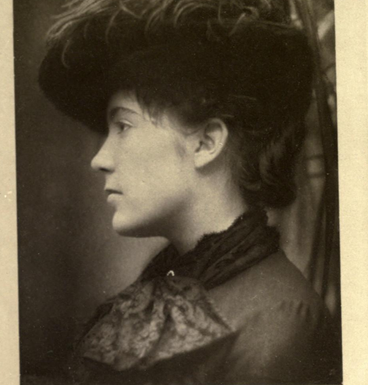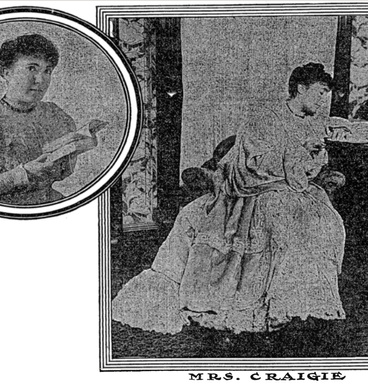
John Oliver Hobbes
(1867-1906)
Pearl Mary Teresa Craigie took the name "John Oliver Hobbes" to participate in T. Fisher Unwin's Pseudonym Library and turned it into her own alter identity. She explained, "Oh, it's [the name's] plainness and crudity were intended as a sort of blow to my supposed sentimentality. It has always been rather a joke" (NYT, Aug 9, 1896). She later specified, "John was my father's name... Oliver seemed to me an appropriate sequence of John, and Hobbes was the ugliest name I could thing of" (NYT, Nov 19, 1905). The NYT states that she chose "Oliver" from Oliver Cromwell, and also reports that her father believes she chose "Hobbes" from Thomas Hobbes (September 10, 1911).
Despite placing her feminine portrait as a frontispiece on several of her novels, she often kept herself and "Hobbes" separate: Hobbes uses he/him pronouns, and Craigie referenced him as a type of muse (The Life of JOH). In the guise of Hobbes, she could write her famous epigrams and dramas--not as herself. Almost all reviews state "Mrs. Cragie" alongside Hobbes' name.
Despite being born in Chelsea, Massachusetts, she considered England, where she grew up, to be her home (NYT, Aug 9, 1896). Specifically, she lived on the Isle of Wright. She married Reginald Walpole Craigie in 1887, has a son in 1890, and was happy divorced in 1891. She retained custody of her son, John Churchill Craigie. In 1892 she joined the Catholic Church. (NYT, Aug 14, 1906).
After arriving in the US in November of 1905, Hobbes gave a lecture tour on art (NYT, Nov 19, 1905). She left for home on February 8th and died suddenly in her sleep of heart disease on August 13th (NYT, Aug 14, 1906). The the last four chapters of her novel A Time to Love were unfinished at her death, and it was supposed that Anthony Hope would have completed it for her (NYT, Aug 16, 1906).
Bibliography
Novels:
Some Emotions and a Moral (1891)
The Sinner's Comedy (1892)
A Study in Temptations (1893)
A Bundle of Life (1894)
Falsely attributed to her. The Gentlewoman, an English newspaper, held a contest with two stories written in imitation of a contemporary writer. One was Hobbes. Merriam and Company mistakenly published it in book format under Hobbes' name. (NYT, June 5, 1895)
The Herb-Moon: A Fantasia (1896)
Serialized in Chapman's Apr-Oct 1896.
The School for Saints (1897)
Robert Orange (1900)
Love and the Soul Hunters (1902)
The Vineyard (1904)
Serialized in The Pall Mall Magazine Jun 1903-Apr 1904. Illustrated by C. A. Shepperson.
Images: 1, 2, 3, 4, 5, 6, 7, 8, 9, 10, 11, 12, 13, 14, 15, 16, 17, 18, 19, 20.
Flute of Pan: A Romance (1904)
A "Books in Brief" summary of it is published in The Novel Magazine Oct 1905.
The Dream and the Business (1906)
Serialized in The Grand Magazine Dec 1905-May 1906.
Plays:
The Fool's Hour: The First Act of a Comedy (1894) with George Moore
Seems to have undergone a long drafting, becoming "Peacock's Feather" and "The Three Lovers." Completely rewritten by Moore as "Elizabeth Cooper" (1913), and finally "The Coming of Gabrielle" (1920).
Journeys End in Lovers Meeting: A Proverb in One Act (1894) with George Moore.
She omits his name when the play was published in Tales about Temperaments (1902).
The School for Saints (1897)
A Repentence: A Drama in One Act (1899)
Published in in Tales about Temperaments (1902).
Osbern and Ursyne: A Drama in Three Acts (Jun 1899)
The Bishops̕ Move: A Comedy in Three Acts (1902) with Murray Carson
A Time to Love (1903-1906?) with Edward Rose; the original idea was his but the writing hers.
Short Stories:
The Better Things (Dec 1903) -- The Graphic
The Differing Stars (Dec 1905) -- The London Magazine
Essays:
"Don't Ask Me" (Sept 1894)
A short criticism of the "New Woman"
Plays of the Modern French School (Mar 1901)
What Are the Elements of Social Success for a Girl? (May 1903)
"About Our Fiction" (Oct 1904)
A response with five other authors to D. S. Street's article of the same name (Sep 1904).
The Artists Life (1904)
The Science of Life (1904)
Letters from a Silent Study (1904)
Who Has the Best Time: A Man or a Woman? (Feb 1905)
Article on why women are generally happier than men. Discursive responses found here.
Collections:
Tales about Temperaments (1902)
Contains "The Worm That God Prepared", "'Tis An Ill Flight Without Wings", "A Repentance: A Drama in One Act" (1899), "Price Toto", and "Journeys End In Lovers Meeting" (1894).
Arranged by Zoë Procter, Hobbe's friend and secretary.
Biographical sketch by her father, John Morgan Richards. Introduction by Rev. Bishop Welldon, Dean of Manchester. The letters were selected and arraged by Zoë Procter.












